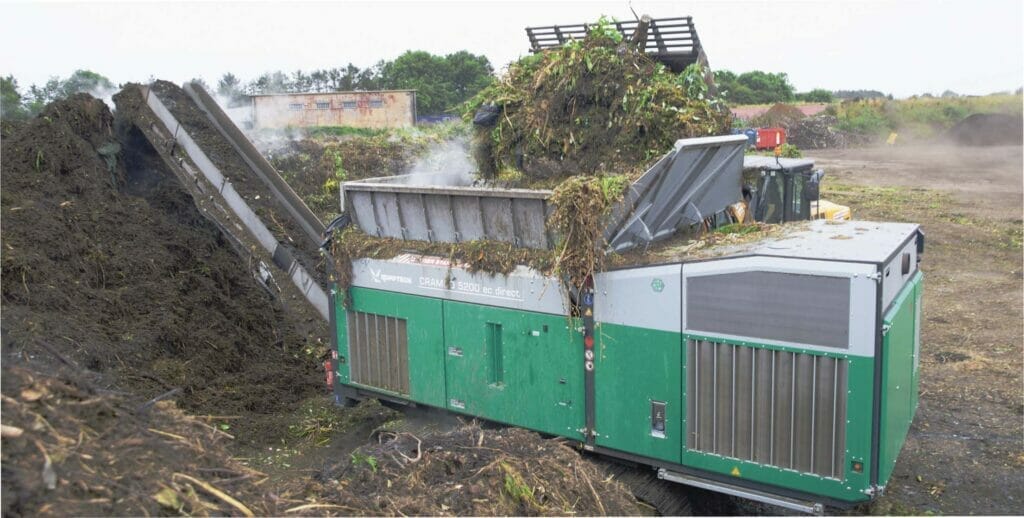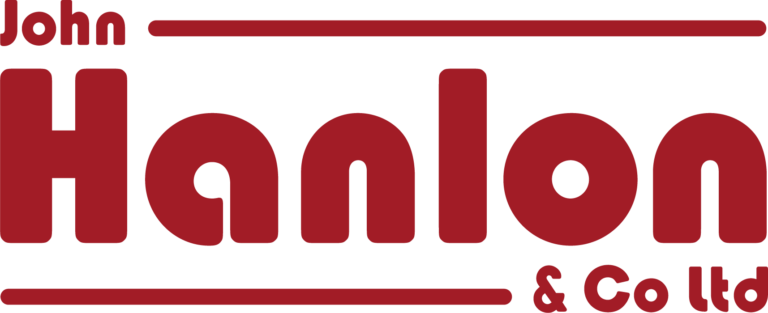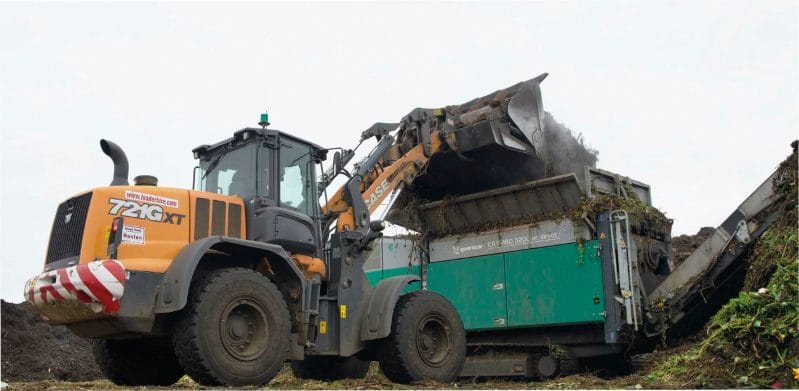Tom Bedford, Director of organics reprocessor AWO Recycling, discusses the company’s long standing relationship with Komptech GB, detailing how the partnership’s continued success is underpinned by technology that improves productivity.
AWO Recycling is a family-owned business based in Cambridgeshire, which principally reprocesses municipal and agricultural green waste. Established in 2006, the company is owned and operated by brothers Tom and Danny Bedford at a 2.5-acre site on the family’s farm near Huntingdon.
Initially Tom and his father Stuart started the composting business, processing waste from vegetable pack houses in the late 90s. It wasn’t until 2004 that the Bedfords decided to scale up, with planning permission and a waste management permit, initially for treating up to 25,000 tonnes at a time.
The company has worked with Komptech equipment to process compost from its open windrow operation from very early on. First with a Komptech Mustang trommel screen, followed by a Magnum three way split screen a few years later. As the business continued to grow, AWO added an Easystar screener from Komptech UK to work alongside the Magnum. This increased the range of products that the company could sell, with improved separation of the oversize fraction to make a biomass product.
As the business evolved, in 2014 it purchased a Hurrikan S windsifter, to replace a trommel screen that had in turn replaced the Magnum. “The biggest problem that faces the composting industry is the oversize that you’re left with at the end. Everyone wants to try and clean up the oversize product free of contamination so they can try and get a market for it,” explains Tom.
The Hurrikan is designed to separate the unwanted elements, using air extraction to expel the lighter plastic fraction and a magnet to extract ferrous metals. A stone belt also allows stones to roll safely out of the equipment.
He adds: “The biomass market is opening up, but it’s still a challenge to get material clean enough to send away for biomass. The Hurrikan is renowned to be the best separator for cleaning up light fractions. Other people have tried, but nothing seems to be better than the Hurrikan.”
For all composting businesses, contamination is a perennial issue. Although the Hurrikan is a significant investment for a business on the scale of AWO Recycling, as far as Tom Bedford is concerned, it boils down to a simple equation: “The question is how much you’re going to spend getting rid of contaminated material, as opposed to spending a little bit on a machine and cleaning it up and not having that big expense.”

After-sales and support
When Komptech appointed John Hanlon to manage its UK dealership in 2016, this helped bring two key supplier relationships for AWO Recycling under one roof. The company had already purchased CASE loading shovels from Hanlon, which according to Bedford, has a reputation ‘second to none’ in the industry for supplying loading shovels.
“When Hanlon took on Komptech, it was a breath of fresh air,” he adds, reflecting that the after-sales and support have played a key role in continuing to buy Komptech equipment.
Although the team at AWO Recycling handles most of their maintenance – Tom’s brother Danny is an experienced engineer – the responsive approach of John Hanlon and Komptech is a big plus. “They do any breakdowns or anything that needs diagnosing,” says Bedford. “They respond if there’s a major breakdown. We’re never waiting long for an engineer to come out. They have plenty of field service engineers out there.”
Scaling up
AWO Recycling has steadily grown its municipal customer base. Last year, it was awarded the contract by Peterborough City Council to process approximately 10,000 tonnes of green waste annually. This adds to commitments taking material from East London Waste Authority’s household waste recycling centres (via ELWA’s contractor Renewi) and a long-term contract with Fenland District Council.
A key element in preparing the operation to manage this has been the recent acquisition of a Komptech Crambo 5200 shredder. “It sounds a bit corny,” says Bedford, “but since we started composting, the Crambo shredder was like the holy grail to us. Everyone wants the Crambo because it is the premium green waste shredder.
“I thought the cost of it was going to be way out of our ballpark, but they [Komptech GB] managed to put together a really good finance package for us over a certain number of years, which made it affordable for us. It’s like a rental agreement with a balloon payment at the end – like a lot of car deals today – but it made it affordable for us. It gave us a brand new machine, which had the throughput that we needed, the reliability we needed. We knew we were going to get back up from Hanlons as well. As we were doubling our capacity, we wanted peace of mind that we wouldn’t have too much downtime with the new machine backup.
“We used to have a high-speed Willibald Shark shredder, but because it was a high-speed shredder, a lot of the contamination in there gets blitzed into more particles than the slow speed Crambo. So if you’ve got a big bin bag, instead of being smashed into 1000 pieces, it’ll probably just get torn into five or six pieces by the slow speed shredder.”
Keeping the plastic contaminants larger makes it easier to sift this at the back end with the Hurrikan. Any oversize can also be put through the Crambo to reshred and also screened out for biomass.
Another feature of the Crambo, which makes a big difference to AWO’s operation, is that it has its own tracks, which makes it easier to move around the site. It is able to manoeuvre into small spaces, in the process saving time. “I would never buy another shredder without tracks again,” comments Bedford, noting the direct impact on productivity: “We get a good hour of extra shredding a day, which adds to the throughput. So we’re able to shred an extra 60 tonnes a day.”
Beyond these investments, AWO has partnered with Komptech GB to rent drum screens when materials require quick shifting. In the January / February period, when the stock of composted material begins to accumulate on-site, the Komptech Cribus 5000 is hired to clear the backlog and supplement AWO’s fleet.
“We’re a lot more confident going for tenders now, having everything that we need on-site,” reflects Bedford on the evolution that his business has undertaken and the confidence that the machinery can meet growing demand.

